General News
Zika virus 'scarier than thought' says US
The Zika virus is "scarier" than first thought and its impact on the US could be greater than predicted, public health officials have admitted.
A wider range of birth defects has been linked to the virus, said Dr Anne Schuchat of the US Centers for Disease Control and Prevention.
And the mosquitoes that carry the virus could travel to more US states than previously thought, she said.
The current Zika outbreak began almost a year ago in Brazil.
It has been linked to thousands of birth defects in the Americas.
"Most of what we've learned is not reassuring," said Dr Schuchat at White House briefing on Monday.
"Everything we know about this virus seems to be scarier than we initially thought."
Earlier this year, US President Obama asked the US Congress for $1.8bn (£1.25bn) in emergency funding to combat the virus.
In the meantime it has been using money totalling $589m left over from the Ebola virus fund.
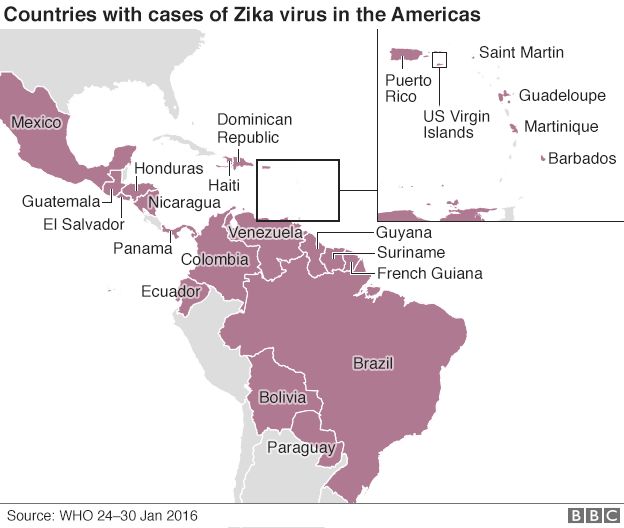
Microcephaly: Why it is not the end of the world
What you need to know Key questions answered about the virus and its spread
Travel advice Countries affected and what you should do
The mosquito behind spread of virus What we know about the insect
Abortion dilemma Laws and practices in Catholic Latin America
That was a temporary stopgap and inadequate to get the job done, said Dr Anthony Fauci of the National Institutes of Health.
The US now needs more money to fight the mosquitoes and to fund better research into vaccines and treatments, he said.
"When the president asked for $1.9 billion, we needed $1.9 billion."
He said there had been recent discoveries about how destructive Zika appeared to be to foetal brains.
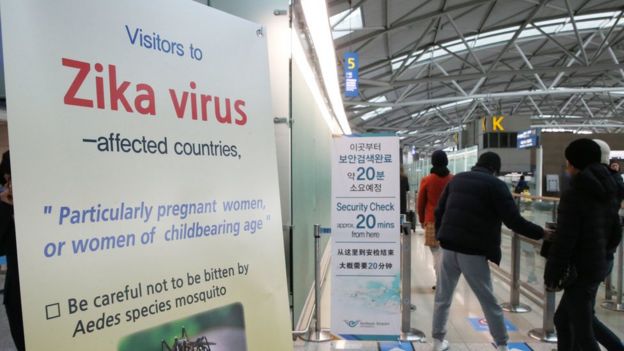
The rapid spread of the Zika virus has spurred travel warnings across the globe
There were also reports of rare neurologic problems in adults, he said.
The CDC announced that Puerto Rico is to receive $3.9m in emergency Zika funding as the number of cases there doubles every week.
In February, the first US case of locally transmitted Zika was reported in Dallas, Texas - spread through sexual contact, not a mosquito bite.
Source: bbc.com
- Read more
-
12/Apr/2016
North Korea 'tests long-range missile engine'
North Korea says it has successfully tested an engine designed for an intercontinental ballistic missile.
The new type of engine would "guarantee" the ability to launch a nuclear strike on the US mainland, the KCNA news agency said.
The test was conducted at the country's long-range missile launch site near its west coast.
It is the latest in a series of tests and launches carried out by the isolated nation.
Can South Korea defend itself?
Dealing with the North: Carrots or sticks?
How advanced is North Korea's nuclear programme?
Leader Kim Jong-un supervised the test, state media reported, during which "the engine spewed out huge flames with a deafening boom".
The country would now be able to "keep any cesspool of evils in the earth including the US mainland within our striking range," Mr Kim was quoted as saying.
In March, North Korea said it had developed nuclear warheads small enough to fit on ballistic missiles.
However, experts cast doubt on the claims.
March also saw North Korea threaten "indiscriminate" nuclear strikes on the US and South Korea as they held big joint military drills, which the north sees as a rehearsal for an eventual invasion.
Meanwhile, the US has imposed new sanctions on North Korea following a nuclear test in January and a satellite launch in February, which was widely seen as a test of banned missile technology.
The US has also held talks with South Korea aimed at deploying a US missile defence system to the Korean peninsula, a move strongly opposed by North Korea, Russia and China.
Beijing says the Thaad anti-missile system compromises its security and would undermine its nuclear deterrent.
Source: bbc.com
- Read more
-
09/Apr/2016
Two dead in US Air Force base shooting
A shooting at a US Air Force base in Texas has left at least two people dead, police say.
Officials have told US media that an airman shot his commander in an apparent murder-suicide.
Police responded to reports of a shooting at Joint Base San Antonio-Lackland around 09:00 local time (15:00 BST), a spokesman said.
Two bodies were found in a room at the base, and authorities believe the gunman is one of the dead.
The Bexar County Sheriff's Office said they continued to search the buildings after finding the people who were killed.
"There are no indications that this was a terrorist attack," an Air Force statement said.
Joint Base San-Antonio Lackland is the military's largest joint base, where airmen do basic training.
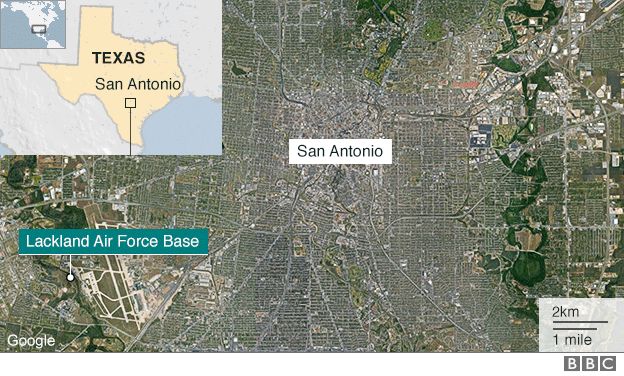
Source: bbc.com
- Read more
-
08/Apr/2016
Paris attacks: Key suspect Abrini arrested in Brussels
The key remaining suspect in November's Paris terror attacks, Mohamed Abrini, has been arrested in Belgium, prosecutors have confirmed.
Belgian media say Abrini is also likely to be the "man in the hat" seen on CCTV before bomb blasts in the Brussels airport departure hall on 22 March.
Five arrests were made on Friday. One suspect, Osama K, will be investigated over the bomb attack on the metro that followed the airport bombing.
The two attacks left 32 people dead.
The gun and bomb attacks in Paris on 13 November killed 130 people.
New footage
Amateur footage said to be of Abrini's arrest shows a man being bundled into a car in Place Albert in the Anderlecht district of Brussels.
Abrini had not been directly linked to the Brussels attacks until today.
Belgian investigators confirmed at a press conference that Abrini was among those detained. Two more suspects were arrested with him.
They said the fourth arrested man, named as Osama K, was being investigated for helping suicide bomber Khalid el-Bakraoui at the Maelbeek metro station.
The prosecutor's office said he had been filmed in Brussels buying sports bags used to hide the airport and metro station bombs.
The authorities had on Thursday released new video footage of the so-called "man in the hat", appealing for the public's help in finding him.
The individual in the footage was seen beside the two suicide bombers at Brussels airport. He left the airport shortly before the blasts.
At the press conference, the investigators said they were trying to determine whether the "man in the hat" was Abrini.
Childhood friends
Abrini, 31, a Belgian national of Moroccan origin, is believed to have been filmed at a petrol station with Salah Abdeslam, another arrested Paris attacks suspect, two days before the attacks there.
Abrini and brothers Salah and Brahim Abdeslam were all childhood friends from Brussels.
Abrini is believed to have driven twice with the brothers from Belgium to Paris and back on 10 and 11 November.
Salah Abdeslam was detained in Brussels in March, days before militants launched attacks in the Belgian capital.
Brahim Abdeslam blew himself up at the Comptoir Voltaire restaurant after a shooting spree.
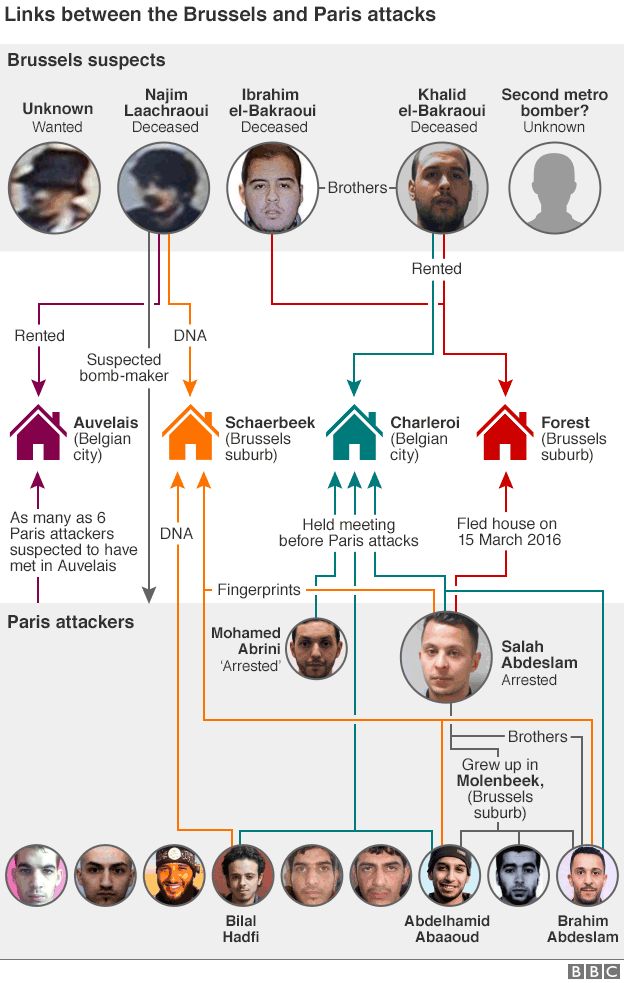
Source: bbc.com
- Read more
-
08/Apr/2016
Pope Francis to make key marriage pronouncement
Pope Francis is to make public the conclusions of his two Synods on the family in a document eagerly awaited by 1.3 billion Roman Catholics.
It will detail the pope's views about family life, marriage, contraception and bringing up children.
Many hope it will open the way for the church to offer communion to the divorced and civilly remarried, something conservatives have resisted.
The document is the culmination of three years' work by the Pope.
BBC religious affairs correspondent Caroline Wyatt says that what is known as an Apostolic Exhortation is a wide-ranging document of more than 200 pages entitled The Joy of Love.
Pope's reforms polarise the Vatican
Interpreting pope's contraception hint
The Pope sent a questionnaire to families across the world asking them about their hopes and their fears.
Then he brought bishops and cardinals together for two Synods in Rome, at which he encouraged them to debate and even to disagree over issues that divide the church in many countries.
Those range from offering communion for the divorced and remarried, contraception and the treatment of Catholics who are gay.
Our correspondent says the lengthy document will show exactly where Pope Francis stands - with some already describing it as a Papal bombshell - as he steps into the minefield of Catholic teaching on the family.
While conservatives do not want him to change doctrine, liberals hope he will tell the church to show a more merciful attitude to those whose families do not conform to the current Catholic ideal.
Some in the church have called for measures which allow a priest or a bishop to decide privately, on a case-by-case basis, if a Catholic who has divorced and remarried can be fully readmitted and receive communion.
While progressives such as the influential Cardinal Walter Kasper of Germany support this policy, conservatives maintain it would devalue the principle established by Jesus of marriage being indissoluble.
At the conclusion of the Synod last year, Francis castigated church leaders who he accused of burying their heads in the sand over the issue, arguing that their adherence to rigid doctrine was over-riding their concern for the suffering of families.
The papal document is also expected to call for better marriage preparation while repeating the Synod's view that homosexual unions cannot be on a par with heterosexual marriage.
Source: bbc.com
- Read more
-
08/Apr/2016
Migrant crisis: Deportations resume from Greece to Turkey
A second group of migrants is being sent back from Greece to Turkey as part of an EU deal to reduce the numbers reaching Europe.
Three protesters dived into the water to try to stop a ferry carrying 45 Pakistani men as it left Lesbos but were fished out by coastguards.
Other protesters tried to enter the gates of the port, Mytilene.
Some 200 mainly Pakistanis were deported on Monday but the process stalled as asylum applications surged.
Under the EU deal with Turkey, migrants who have arrived illegally in Greece since 20 March are expected to be sent back to Turkey if they do not apply for asylum or if their claim is rejected.
And for each Syrian migrant returned to Turkey, the EU is due to take in another Syrian who has made a legitimate request.
- Migrants await fate on Lesbos
- The crisis in seven charts
- Short journey back - BBC correspondents in Turkey and Greece
Water and breakfast
Each person being deported is accompanied by a guard from the EU's border agency, Frontex.
A Frontex spokesperson said there had been no trouble bringing the migrants from a camp to the port.
"There were escorts with each returnee plus a back-up team," Ewa Moncure told reporters. "Also, in addition, on board the ferry there was a doctor and translators.
"Now on the way to Turkey, migrants will be given water and breakfast. They all had return decisions. Nobody indicated to our escorts last-minute that they would like to apply for international protection."
Greek customs officials told the BBC that 140 people would be travelling on two boats on Friday, with the second carrying 95 from other islands.
Of those being returned to Turkey on Friday, the non-Syrians will be taken to deportation centres while any Syrians will be taken to refugee camps to take the place of Syrian refugees who will be directly resettled in the EU.
Turkey's President Recep Tayyip Erdogan has warned his country will only implement the deal if the EU sticks to its side of the bargain:
- A further €3bn (£2.4bn; $3.4bn)
- Galvanising Turkey's EU accession process
- Granting Turks visa-free travel to the EU's Schengen area by the end of June
German Chancellor Angela Merkel, whose country has taken in the bulk of the asylum seekers so far, said on a visit to France she was "very happy" with progress in resolving the migrant crisis.
'Shame on you'
The small group of protesters in Mytilene chanted "EU - shame on you".
One million migrants and refugees have entered the EU by boat from Turkey to Greece since early last year.
The returns arrangement has alarmed rights groups, who say Turkey is not a safe country for migrants.
Citizens of Pakistan make up the fourth-biggest group of undocumented migrants arriving in Greece this year, after Syrians, Afghans and Iraqis.
Migrant arrivals to Greece
152,137
in 2016, up to 4 April
-
37% of 2016 arrivals are children
-
53% arrive on Lesbos
-
366 died on Turkey-Greece route
-
853,650 arrivals in 2015
In the first three months of the year, 5,317 Pakistanis entered the country. Some of them are reported to have started a hunger strike at Moria camp on Lesbos.
"We risked our lives to come here, we don't want to go back to Turkey because they are going to send us back to Pakistan," one man. who called himself Ali, told AFP news agency.
"We don't want to apply for asylum in Greece, we want to go to Germany."
According to Amnesty International, people detained on Lesbos and another island, Chios, have virtually no access to legal aid, and limited access to services and support.
Migrant arrivals in Greece by sea from Turkey have dropped sharply, from a couple of thousand per day early last month to the hundreds this month, data from the International Organization for Migration show.
Meanwhile, some 11,000 migrants remain camped at Greece's border with Macedonia, prevented from heading northwards to other EU states.
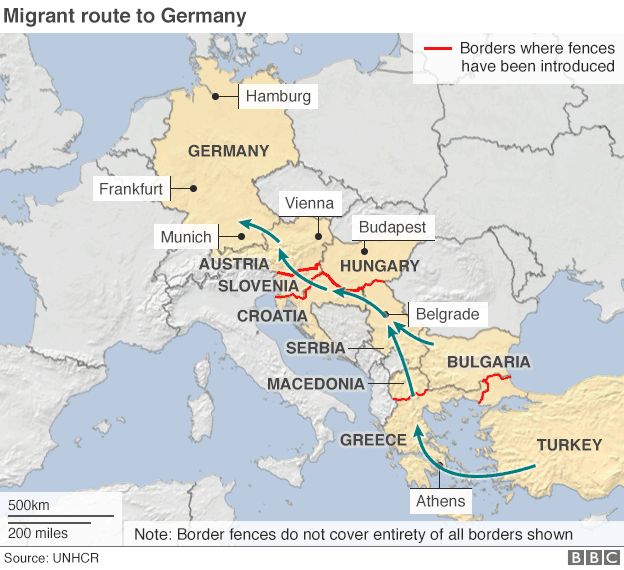
Source: bbc.com
- Read more
-
08/Apr/2016
Panama papers: Iceland names PM replacement
Iceland's ruling coalition has named Sigurdur Ingi Johannsson as the new PM, with early elections to be held in the autumn.
Mr Johannsson, 53, is agriculture and fisheries minister and deputy leader of the Progressive Party (PP).
The move comes after PM and PP chairman Sigmundur Gunnlaugsson stepped down in the wake of the leaked Panama Papers.
The leaks, from Panama law firm Mossack Fonseca, showed Mr Gunnlaugsson owned an offshore firm with his wife.
It was not declared when he became an MP. Mr Gunnlaugsson says he sold his shares to his wife and denies any wrongdoing. But he is accused of concealing millions of dollars' worth of family assets.
- Voices from Iceland
- BBC reporters on global reaction
- Major banks' denials
- UK PM 'doesn't gain from offshore funds'
- Panama Papers: Q&A
- Watergate to Wikileaks: Leaks that shook the world
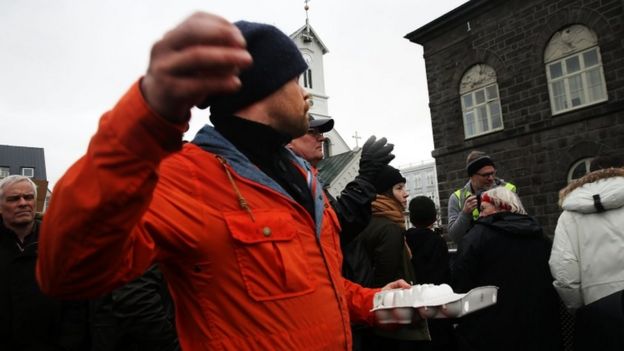
At the scene: Paul Adams, BBC News, Reykjavik
With protesters keeping up a steady drumbeat of pots and pans outside parliament, for the third day in a row, members of Iceland's political parties held lengthy discussions inside.
The demonstrators sensed a deal was in the offing, and hurled eggs and fruit at the building as a mark of disgust. For many of them, nothing less than the resignation of the entire government would do.
But eventually came word that the two coalition parties, the Progressives and Independents, had reached agreement.
Opposition parties don't like the deal and some are vowing to go ahead with a vote of no confidence. The government has a comfortable majority and it seems the crisis may be over, for now.
But polls suggest the Progressive Party has lost much of its support and that the tiny Pirate Party, founded just over three years ago, stands to make significant gains. Unless this government's fortunes change, it could be out of power in a few months' time.
Mr Gunnlaugsson is one of dozens of high-profile global figures mentioned in the 11.5 million leaked financial and legal records, which were first published on Sunday.
Pressure on Mr Gunnlaugsson to step down had been building since then, with thousands of people protesting outside the parliament building in the capital Reykjavik on Monday and opposition parties tabling a confidence motion.
Earlier on Tuesday, Mr Gunnlaugsson had asked President Olafur Ragnar Grimsson to dissolve parliament and call an early election, although the president said he would need to talk to parties.
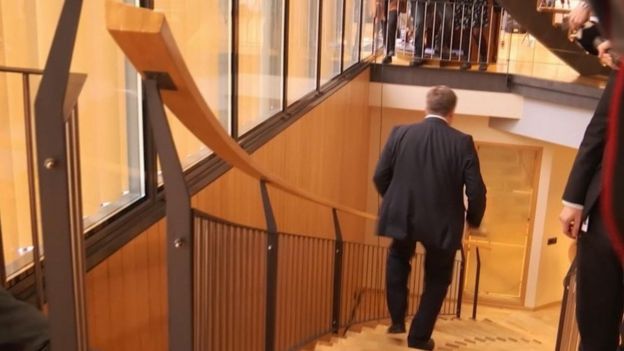
Iceland's prime minister stepped down ahead of a confidence vote in parliament
But later on Wednesday, Mr Johansson said: "We expect to have elections this autumn," adding that in the meantime the government had work to do.
"We will continue to lead a good government and keep up the good work we have worked on for the last three years and get finished with all those good works we have started on," he said.
Pirate Party leader Birgitta Jonsdottir also told reporters in parliament that early elections would be held in the autumn.
Mr Gunnlaugsson has put out a statement insisting he has not in fact resigned and that Mr Johannsson will take over the post "for an unspecified amount of time".
The documents leaked from Mossack Fonseca show that Mr Gunnlaugsson and his wife bought the company Wintris in 2007.
He did not declare an interest in the company when entering parliament in 2009. He sold his 50% of Wintris to his wife, Anna Sigurlaug Palsdottir, for $1 (£0.70) eight months later.
Mr Gunnlaugsson maintains no rules were broken and his wife did not benefit financially.
In his statement, Mr Gunnlaugsson said he had no wish to stand in the way of further government work, such as reform of the financial system.
Panama Papers - tax havens of the rich and powerful exposed
- Eleven million documents held by the Panama-based law firm Mossack Fonseca have been passed to German newspaper Sueddeutsche Zeitung, which then shared them with the International Consortium of Investigative Journalists. BBC Panorama is among 107 media organisations - including UK newspaper the Guardian - in 76 countries which have been analysing the documents. The BBC does not know the identity of the source
- They show how the company has helped clients launder money, dodge sanctions and evade tax
- Mossack Fonseca says it has operated beyond reproach for 40 years and never been accused or charged with criminal wrong-doing
- Tricks of the trade: How assets are hidden and taxes evaded
- Panama Papers: Full coverage; follow reaction on Twitter using #PanamaPapers; in the BBC News app, follow the tag "Panama Papers"
- Watch Panorama on the BBC iPlayer (UK viewers only)
Source: bbc.com
- Read more
-
06/Apr/2016
Fake US university exposes 'pay-to-stay' immigration fraud
Twenty-one people have been arrested after US authorities set up a fake university to expose immigration fraud.
Officials said the accused knew that the University of Northern New Jersey did not exist, but they were unaware it was a ruse run by immigration agents.
The defendants acted as brokers for more than 1,000 foreigners who sought to maintain student and work visas, prosecutors said.
Most foreign nationals involved in the scheme came from China and India.
Immigration authorities will deal with the nationals affected, but they will not be prosecuted, officials said.
"This was just another stop on the 'pay-to-stay' tour," Paul Fishman, US attorney for New Jersey, told the Associated Press.
Federal agents set up a fake website and posed as administrators who dealt with suspects.
The agents' recorded conversations with the defendants showed that the practice of paying to extend visas had been going on for years, prosecutors said.
Source: bbc.com
- Read more
-
05/Apr/2016
Whatsapp adds end-to-end encryption
Instant messaging service Whatsapp has announced it will encrypt all its users' communications from Tuesday.
With end-to-end encryption, messages are scrambled as they leave the sender's device and can only be decrypted by the recipient's device.
It renders messages unreadable if they are intercepted, for example by criminals or law enforcement.
Whatsapp, which has a billion users worldwide, said file transfers and voice calls would be encrypted too.
The Facebook-owned company said protecting private communication was one of its "core beliefs".
Encryption was thrown under the spotlight after the FBI asked Apple to help it access data on an iPhone used by California gunman Syed Farook.
Whatsapp said: "The idea is simple: when you send a message, the only person who can read it is the person or group chat that you send that message to. No one can see inside that message. Not cybercriminals. Not hackers. Not oppressive regimes. Not even us."
Users with the latest version of the app were notified about the change when sending messages on Tuesday. The setting is enabled by default.
Amnesty International called the move a "huge victory" for free speech.
"Whatsapp's roll out of the Signal Protocol, providing end to end encryption for its one billion users worldwide, is a major boost for people's ability to express themselves and communicate without fear," the organisation said in a statement.
"This is a huge victory for privacy and free speech, especially for activists and journalists who depend on strong and trustworthy communications to carry out their work without putting their lives at greater risk."
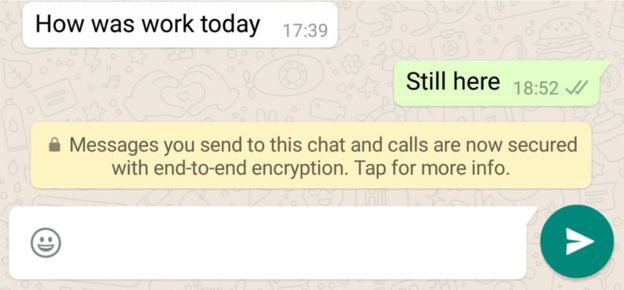
Whatsapp's decision was also welcomed by security professionals.
"Wire-tappers lament, law-abiding citizens rejoice, for WhatsApp's latest update is a victory for communications privacy," said Lee Munson, a security researcher for Comparitech.
"With the ability to access data removed even from the company behind the app, only ill-informed law enforcement agencies are likely to mutter 'terrorists' as the masses enjoy the encrypted text messages, photos, video and phone calls they've been demanding ever since Edward Snowden blew the lid on government surveillance."
The move is likely to irk law enforcement agencies, particularly the US Department of Justice which has recently expressed concern over "unreachable" information contained in devices. The DoJ did not respond to the BBC's request for comment on Tuesday.
Other messaging apps with end-to-end encryption include Telegram, which is known to be used by the so-called Islamic State to share information.
Source: bbc.com
- Read more
-
05/Apr/2016
Two aeroplanes collide at Jakarta airport
Two planes collided at an airport in Indonesia's capital Jakarta, resulting in a wing bursting into flames.
A Batik Air passenger plane was taking off when its wing clipped the tail of a TransNusa aircraft being towed across the runway.
Authorities said there were no injuries in the Monday night incident, and all passengers were evacuated safely.
Indonesia has had a dismal air safety record amid a boom in air travel, particularly with budget carriers.
Mangled parts
The incident took place at the largely-domestic Halim Perdanakusuma airport in Jakarta, causing the temporary closure of the airport.
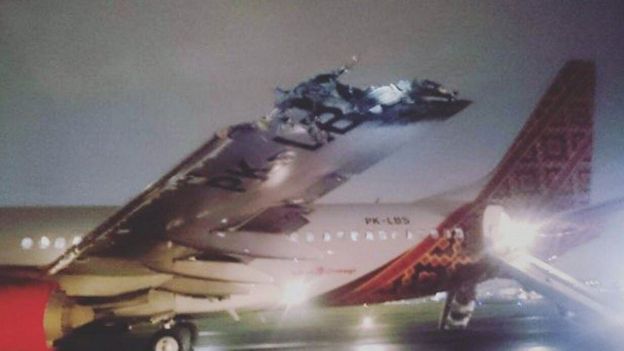
The Batik Air plane (pictured) and the TransNusa aircraft both suffered damage
The Batik Air plane was carrying 49 passengers and crew, reported AFP news agency.
A spokesman for budget carrier Lion Air Group, which owns Batik Air, told the wire news agency that the pilot had aborted the takeoff after the collision, and passengers and crew were safe.
Transport ministry officials said the collision had mangled parts of both aircraft. A video posted online shows flames erupting from the Batik Air plane wing.
In 2013, a Lion Air plane overshot the runway at Bali's Denpasar airport and crashed into the sea, in an incident that hospitalised at least 22 people.
That same year another Lion Air plane skidded off a runway on the island of Sulawesi after it crashed into a cow.
In 2014, an Indonesian subsidiary of AirAsia flying from Surabaya to Singapore crashed into the sea, killing all 162 onboard.
Source: bbc.com
- Read more
-
04/Apr/2016
Vitamin D 'heals damaged hearts'
Vitamin D supplements may help people with diseased hearts, a study suggests.
A trial on 163 heart failure patients found supplements of the vitamin, which is made in the skin when exposed to sunlight, improved their hearts' ability to pump blood around the body.
The Leeds Teaching Hospitals team, who presented at a meeting of the American College of Cardiology, described the results as "stunning".
The British Heart Foundation called for longer trials to assess the pills.
Vitamin D is vital for healthy bones and teeth and may have important health benefits throughout the body but many people are deficient.
No safe way to suntan - warning
The average age of people in the study was 70 and like many people that age they had low levels of vitamin D even in summer.
"They do spend less time outside, but the skin's ability to manufacture vitamin D also gets less effective [with age] and we don't really understand why that is," said consultant cardiologist Dr Klaus Witte.
Patients were given either a 100 microgram vitamin D tablet or a sugar pill placebo each day for a year.
And researchers measured the impact on heart failure - a condition in which the heart becomes too weak to pump blood properly.
The key measure was the ejection fraction, the amount of blood pumped out of the chambers of the heart with each beat.
In a healthy adult the figure is between 60% and 70%, but only a quarter of the blood in the heart was being successfully pumped out in the heart failure patients.
But in those taking the vitamin pills, the ejection fraction increased from 26% to 34%.
Dr Witte told the BBC News website: "It's quite a big deal, that's as big as you'd expect from other more expensive treatments that we use, it's a stunning effect.
"It's as cheap as chips, has no side effects and a stunning improvement on people already on optimal medical therapy, it is the first time anyone has shown something like this in the last 15 years."
The study also showed the patients hearts became smaller - a suggestion they are becoming more powerful and efficient.
In the UK, people over 65 are advised to take 10 microgram supplements of the vitamin.
However, Dr Witte does not think high-dose vitamin D should be routine prescribed just yet.
He told the BBC: "We're a little bit off that yet, not because I don't believe it, but data have shown improvements in heart function, they may show improvements in symptoms and we now need a large study."
It is also not clear exactly how vitamin D is improving heart function, but it is thought every cell in the body responds to the vitamin.
Most vitamin D comes from sunlight, although it is also found in oily fish, eggs and is added to some foods such as breakfast cereals.
Prof Peter Weissberg, from the British Heart Foundation, cautioned that the patients seemed no better at exercise.
And added: "A much bigger study over a longer period of time is now needed to determine whether these changes in cardiac function can translate into fewer symptoms and longer lives for heart failure patients."
Source: bbc.com
- Read more
-
04/Apr/2016
Panama Papers: Mossack Fonseca 'helped firms subject to sanctions'
The Panama legal firm at the heart of a massive data leak kept clients who were subject to international sanctions, documents show.
Mossack Fonseca worked with 33 individuals or companies who have been placed under sanctions by the US Treasury, including companies based in Iran, Zimbabwe and North Korea.
One had links to North Korea's nuclear weapons programme.
The information comes from the leak of 11m of the company's internal files.
Mossack Fonseca registers companies as offshore entities operated under its own name. This meant the identities of the real owners were hard to trace because they were kept out of public documents.
Owners from Pyongyang
Some of the businesses were registered before international sanctions were imposed. But in several cases Mossack Fonseca continued to act as a proxy for them after they were blacklisted.
DCB Finance was established in 2006, with its owners and directors based in North Korea's capital Pyongyang. It was later put under sanctions by the US Treasury for raising funds for the North Korean regime and being linked to a bank helping to fund the regime's nuclear weapons programme.
The leaked files reveal the owners of DCB Finance were a North Korean official, Kim Chol Sam and Nigel Cowie, a British banker who was also CEO of the sanctioned Daedong Credit Bank.
Mossack Fonseca appears to have overlooked that the owners and directors of the company were based in Pyongyang until it was contacted by the British Virgin Islands (BVI) authorities in 2010, inquiring about another company Mossack Fonseca had set up with directors in North Korea.
Mossack Fonseca resigned as agents for DCB Finance in September 2010.
Panama Papers - read more from BBC News
- Q&A on Panama Papers
- David Cameron's father was a Mossack Fonseca client.
- Iceland's PM refuses to resign
- China leaders' relatives named in leaks
- Putin associates linked to 'money laundering'
- Pakistan PM Nawaz Sharif's son defends offshore companies
- Ukrainian President Petro Poroshenko says he has done nothing wrong
- Australia's tax office says it is investigating 800 individuals named in the leaks
- How a 90-year-old Briton covered for a US millionaire
- World media reaction: How Moscow and Beijing reported Panama
- Panama Papers - Monday's developments
In 2013 the BVI authorities contacted Mossack Fonseca again, asking what checks they had carried out before opening DCB Finance in 2006.
An email from Mossack Fonseca's compliance department on 9 August 2013 says: "We have not yet addressed the reason we maintained a relationship with DCB Finance when we knew or ought to have known from incorporation in 2006, that the country, North Korea was on the black list."
It adds: "We should have identified from the onset that this was a high risk company."
Mr Cowie was not placed under sanctions. He has said that DCB Finance was established for legitimate business purposes and that he was "unaware, whether directly or indirectly, of any transactions being made with any sanctioned organisation or for any sanctioned purpose, during my entire tenure".
Assad's cousin
Another case involves Rami Makhlouf, who is the cousin of Syria's President Bashar al-Assad and has reported wealth of $5bn.
In 2008 the US Treasury imposed sanctions on him because it deemed him to be a "regime insider" and someone who "manipulated the Syrian judicial system and used Syrian intelligence officials to intimidate his business rivals".
Mossack Fonseca continued to front six businesses - including one company called Drex Technologies - for Mr Makhlouf after the restrictions were put in place.
The files also show the Swiss branch of HSBC provided financial services for the firm.
In 2010, two years after the sanctions were imposed, HSBC wrote to Mossack Fonseca saying it believed Drex Technologies was a company of "good standing".
An internal email from Mossack Fonseca's compliance department also suggests HSBC staff dealing with Drex Technologies knew who Rami Makhlouf was.
The email, dated 17 February 2011, says: "We have contacted HSBC who stated that they are very aware of the fact that Mr Makhlouf is the cousin of the President of Syria.
"The HSBC compliance department of the bank not only in Geneva but also in their headquarters in London know about Mr Makhlouf and confirm that they are comfortable with him."
HSBC said: "We work closely with the authorities to fight financial crime and implement sanctions. Our policy is clear that offshore accounts can only remain open either where clients have been thoroughly vetted where authorities ask us to maintain an account for the purposes of monitoring activity, or where an account has been frozen based on sanctions obligations."
War fuel
Mossack Fonseca cut all its links with Rami Makhlouf in September 2011, nine months after it was first recommended.
But the leaked documents reveal the firm also provided business services to another company that was registered on a US sanctions list in 2014.
The company is called Pangates International Corporation Limited. The US Treasury Department believes it supplied aviation fuel to the Syrian government to fly military aircraft during the current civil war. The files show Mossack Fonseca first incorporated the petroleum firm in 1999.
Nine months after the sanctions came into effect, it was still handling the paperwork for Pangates International Corporation and certified it was a company in the Seychelles of good standing.
It was not until August 2015 that Mossack Fonseca acknowledged the company was on a blacklist and reported it to financial regulators in the Seychelles.
Mossack Fonseca said: "We have never knowingly allowed the use of our companies by individuals having any relationship with North Korea or Syria. We have our own procedures in place to identify such individuals, to the extent it is reasonably possible."
Panama's President Juan Carlos Varela told the BBC his country was willing to contribute to any investigation in any country relating to the documents.
"We are an open country," he said.
Panama Papers - tax havens of the rich and powerful exposed
- Eleven million documents held by the Panama-based law firm Mossack Fonseca have been passed to German newspaper Sueddeutsche Zeitung, which then shared them with the International Consortium of Investigative Journalists. BBC Panorama and UK newspaper The Guardian are among 107 media organisations in 76 countries which have been analysing the documents. The BBC does not know the identity of the source
- They show how the company has helped clients launder money, dodge sanctions and evade tax
- Mossack Fonseca says it has operated beyond reproach for 40 years and never been accused or charged with criminal wrong-doing
- Tricks of the trade: How assets are hidden and taxes evaded
- Panama Papers: Full coverage; follow reaction on Twitter using #PanamaPapers; in the BBC News app, follow the tag "Panama Papers"
Source: bbc.com
- Read more
-
04/Apr/2016
Kenya's William Ruto due to hear war crimes case ruling
Kenyan Vice-President William Ruto is due to find out whether a crimes against humanity case against him will be thrown out by judges at the International Criminal Court (ICC).
Mr Ruto denies murder, deportation and persecution charges during violence that followed the 2007 elections in which about 1,200 people were killed.
His lawyers want the case to be terminated due to a lack of evidence.
Mr Ruto is one of the most senior politicians to be tried by the ICC.
The prosecution case against him has been dogged by repeated setbacks.
In February judges at the ICC barred the use of recanted testimony, meaning that prior recorded witness statements could not be used by prosecutors.
Several key witnesses in the case have changed their statements, which prosecutors said was due to intimidation and bribery.
Mr Ruto's lawyers say he should be acquitted because so many key prosecution witnesses have either dropped or changed their original statements.
ICC prosecutor Fatou Bensouda has acknowledged that the loss of witnesses has weakened the case against the deputy president - but she has argued there still remains enough evidence to proceed with the trial.
A spokesman for the ICC has told the BBC's Anna Holligan in The Hague there are a number of possible scenarios.
The judges could clear Mr Ruto of all the charges, they may ask the prosecution to consider changing the charges or they could reject the defence team's arguments and allow the trial to continue.
In 2014, the prosecutor dropped similar charges against Kenyan President Uhuru Kenyatta, alleging that witnesses had been intimidated to make them change their testimony.
The future of the case now appears to depend on whether the prosecution has proved that it has sufficient evidence to offset a no-case-to-answer move from Mr Ruto's lawyers.
The use of prior testimony falls under Rule 68 of the Rome Statute, which set up the ICC.
But William Ruto's defence team argued this was unfair because changes to the rule were brought in after the case against him and his fellow defendant, the journalist Joshua arap Sang, had started.
Presiding Judge Piotr Hofmanski ruled that prior-recorded testimony was delivered without an opportunity for the accused to cross-examine the witnesses.
Mr Sang, who is accused of using his radio show to organise attacks in the election aftermath, said at the time that the decision was "one step to our freedom".
Mr Ruto and Mr Kenyatta were on opposite sides of the 2007 election, but formed an alliance that won the 2013 election.
Source: bbc.com
- Read more
-
04/Apr/2016
Native American chief Joe Medicine Crow dies aged 102
The historian, World War Two veteran and chief of Montana's Crow tribe Joe Medicine Crow has died aged 102. President Obama awarded Joe Medicine Crow the Presidential Medal of Freedom in 2009.
His grandfather was a scout for US military commander George Custer, who lost his life in the Battle of Little Big Horn fighting Native Americans.
Medicine Crow earned the title of war chief in his tribe through stealing horses and other exploits during World War Two.
He later worked as his tribe's historian, lecturing into his nineties.
"When you spoke with Joe Medicine Crow, it was impossible not to be inspired," Montana senator Jon Tester tweeted.
War bravery
Medicine Crow was raised on the Crow Reservation in the state of Montana where he spent much of his life.
He was the first of his tribe to get a master's degree in 1939, later helping catalogue his people's history through oral testimony.
To become a war chief he successfully performed four daring deeds, including wrestling a weapon from an enemy warrior - in his case a Nazi soldier.
"I never got a scratch," he said decades on, the Billings Gazette reported.
In 2009. President Obama awarded him the Presidential Medal of Freedom.
"His contributions to the preservation of the culture and history of the First Americans are matched only by his importance as a role model to young Native Americans across the country," the White House said at the time.
- Read more
-
03/Apr/2016
Panama Papers: Putin associates linked to 'money laundering'
A suspected money laundering ring involving close associates of Vladimir Putin has been uncovered in a leak of confidential documents.
The billion-dollar operation was run by Bank Rossiya, which is subject to US and EU sanctions following Russia's annexation of Crimea.
Evidence seen by BBC Panorama reveals for the first time how the bank operates.
Documents show how money has been channelled through offshore companies.
They suggest Sonnette Overseas, International Media Overseas, Sunbarn and Sandalwood Continental have profited from fake share transactions, bogus consulting deals, uncommercial loans and the purchase of under-priced assets.
The documents show that International Media Overseas and Sonnette Overseas were officially owned by one of the Russian president's closest friends.
Panama Papers - tax havens of the rich and powerful exposed
- Eleven million documents held by the Panama-based law firm Mossack Fonseca have been passed to German newspaper Suddeutsche Zeitung, which then shared them with the International Consortium of Investigative Journalists. BBC Panorama is among 107 media organisations - including UK newspaper the Guardian - in 78 countries which have been analysing the documents. The BBC doesn't know the identity of the source
- They show how the company has helped clients launder money, dodge sanctions and evade tax
- Mossack Fonseca says it has operated beyond reproach for 40 years and never been accused or charged with criminal wrong-doing
- Tricks of the trade: How assets are hidden and taxes evaded
- Panama Papers: Full coverage; follow reaction on Twitter using #PanamaPapers; in the BBC News app, follow the tag "Panama Papers"
- Watch Panorama at 19:30 on BBC One on Monday, 4 April, or catch up later on the BBC iPlayer (UK viewers only)
Concert cellist Sergei Roldugin has known Vladimir Putin since they were teenagers and is godfather to the president's daughter Maria.
On paper, Mr Roldugin has personally made hundreds of millions of dollars in profits from the suspicious deals.
But documents from Mr Roldugin's companies state that: "The company is a corporate screen established principally to protect the identity and confidentiality of the ultimate beneficial owner of the company."
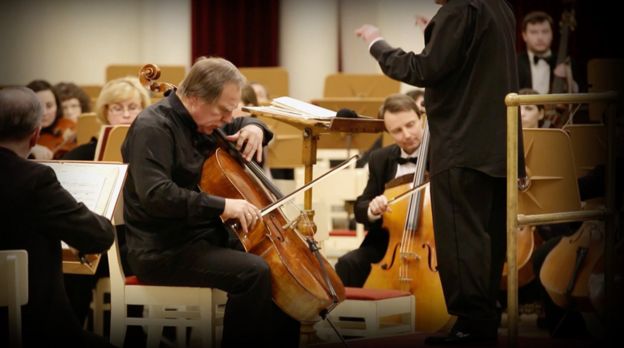
Sergei Roldugin owns a number of offshore companies
The cellist has previously told reporters that he is not a businessman. His involvement in the complex offshore deals will raise suspicion that he is simply acting as a front for someone else.
Suspicious activity
In one example, documents show that Sandalwood Continental bought an asset for just $1 (70p) and sold it three months later for $133m (£93m).
Sandalwood was also given $800m (£562m) of loans by a Russian state bank. There is no evidence in the documents of Sandalwood providing security for the loans or making repayments.
Tom Keatinge - who runs the Centre for Financial Crime and Security Studies - says the transactions appear to be evidence of money laundering.
"There's nothing that I have seen which would make me say anything other than 'Stop, we need to investigate very closely what's going on here.' Whether it's loans being written off with no apparent compensation, other than the dollar, or whether it's loans being assigned through multiple pairs of hands for no obvious reason."
The documents show that one of the Roldugin companies, International Media Overseas, borrowed $6m (£4.2m) in 2007. Three months later the loan was written off for just $1, so the cellist's company had been given $6m.
In another suspicious deal in 2011, International Media Overseas bought all the rights - including interest and repayments - to a $200m (£140m) loan.
International Media Overseas paid just a single dollar, even though the interest payments alone were worth $8m (£5.6m) a year to Mr Roldugin's company.
Andrew Mitchell QC, one of the UK's leading experts on money laundering, says the deals are highly suspicious: "There can't be a commercial basis for transferring $200m and the rights to $8m a year for a dollar."
Source: bbc.com
- Read more
-
03/Apr/2016
Khalid al-Barnawi: Nigeria Islamist group head 'arrested'
The leader of al-Qaeda-linked Islamist group Ansaru has been arrested in Nigeria, authorities there say.
A military spokesman said Khalid al-Barnawi was captured in Lokoja, capital of the central state of Kogi.
The US had placed a $5m (£3.5m) bounty on his head after branding him one of three Nigerian "specially designated global terrorists" in 2012.
Ansaru is a splinter group of Nigeria's largest jihadist group, Boko Haram, known for kidnapping foreigners.
Ideologically aligned to al-Qaeda in the Islamic Maghreb, it is also accused of killing a number of Westerners.
Ansaru said it carried out an attack on a maximum security prison in the Nigerian capital Abuja in 2012, freeing dozens of inmates.
"Security agents made a breakthrough on Friday in the fight against terrorism by arresting Khalid al-Barnawi, the leader of Ansaru terrorist group in Lokoja," military spokesman Brigadier General Rabe Abubakar said.
"He is among those on top of the list of our wanted terrorists."
Source: bbc.com
- Read more
-
03/Apr/2016
Panama Papers: Mossack Fonseca leak reveals elite's tax havens
A huge leak of confidential documents has revealed how the rich and powerful use tax havens to hide their wealth.
Eleven million documents were leaked from one of the world's most secretive companies, Panamanian law firm Mossack Fonseca.
They show how Mossack Fonseca has helped clients launder money, dodge sanctions and evade tax.
The company says it has operated beyond reproach for 40 years and has never been charged with criminal wrong-doing.
The documents show links to 72 current or former heads of state in the data, including dictators accused of looting their own countries.
Gerard Ryle, director of the International Consortium of Investigative Journalists (ICIJ), said the documents covered the day-to-day business at Mossack Fonseca over the past 40 years.
"I think the leak will prove to be probably the biggest blow the offshore world has ever taken because of the extent of the documents," he said.
Panama Papers - tax havens of the rich and powerful exposed
- Eleven million documents held by the Panama-based law firm Mossack Fonseca have been passed to German newspaper Suddeutsche Zeitung, which then shared them with the International Consortium of Investigative Journalists. BBC Panorama is among 107 media organisations - including UK newspaper the Guardian - in 78 countries which have been analysing the documents. The BBC doesn't know the identity of the source
- They show how the company has helped clients launder money, dodge sanctions and evade tax
- Mossack Fonseca says it has operated beyond reproach for 40 years and never been accused or charged with criminal wrong-doing
- Tricks of the trade: How assets are hidden and taxes evaded
- Panama Papers: Full coverage; follow reaction on Twitter using #PanamaPapers; in the BBC News app, follow the tag "Panama Papers"
- Watch Panorama at 19:30 on BBC One on Monday, 4 April, or catch up later on the BBC iPlayer (UK viewers only)
The data contains secret offshore companies linked to the families and associates of Egypt's former president Hosni Mubarak, Libya's former leader Muammar Gaddafi and Syria's president Bashar al-Assad.
Russian connection
It also reveals a suspected billion-dollar money laundering ring that was run by a Russian bank and involved close associates of President Putin.
The operation was run by Bank Rossiya, which is subject to US and EU sanctions following Russia's annexation of Crimea.
The documents reveal for the first time how the bank operates.
Money has been channelled through offshore companies, two of which were officially owned by one of the Russian president's closest friends.
Concert cellist Sergei Roldugin has known Vladimir Putin since they were teenagers and is godfather to the president's daughter Maria.
On paper, Mr Roldugin has personally made hundreds of millions of dollars in profits from suspicious deals.
But documents from Mr Roldugin's companies state that: "The company is a corporate screen established principally to protect the identity and confidentiality of the ultimate beneficial owner of the company."
Read more: Putin associates linked to 'money laundering'
Iceland connection
Mossack Fonseca data also shows how Icelandic Prime Minister Sigmundur Gunnlaugsson had an undeclared interest in his country's bailed-out banks.
Mr Gunnlaugsson has been accused of hiding millions of dollars of investments in his country's banks behind a secretive offshore company.
Leaked documents show that Sigmundur Gunnlaugsson and his wife bought offshore company Wintris in 2007.
He did not declare an interest in the company when entering parliament in 2009. He sold his 50% of Wintris to his wife for $1 (70p), eight months later.
Mr Gunnlaugsson is now facing calls for his resignation. He says he has not broken any rules, and his wife did not benefit financially from his decisions.
The offshore company was used to invest millions of dollars of inherited money, according to a document signed by Mr Gunnlaugsson's wife Anna Sigurlaug Pálsdóttir in 2015.
Read more: Iceland PM's investments questioned
'Beyond reproach'
In addition, Mossack Fonseca supplied a front man who pretended to own $1.8m, so the real owner could get the cash from the bank without revealing their identity.
Mossack Fonseca says it has always complied with international protocols to ensure the companies they incorporate are not used for tax evasion, money-laundering, terrorist finance or other illicit purposes.
The company says it conducts thorough due diligence and regrets any misuse of its services.
"For 40 years Mossack Fonseca has operated beyond reproach in our home country and in other jurisdictions where we have operations. Our firm has never been accused or charged in connection with criminal wrongdoing.
"If we detect suspicious activity or misconduct, we are quick to report it to the authorities. Similarly, when authorities approach us with evidence of possible misconduct, we always cooperate fully with them."
Mossack Fonseca says offshore companies are available worldwide and are used for a variety of legitimate purposes.
See more at the International Consortium of Investigative Journalists
Source: bbc.com
- Read more
-
03/Apr/2016
BNI frees man accused of leaking pictures of NDC branded cars
The Bureau of National Investigations has released the Managing Director of a quarry company, Marbles and Granites, who allegedly circulated photos of Mahindra vehicles, branded in National Democratic Congress (NDC) colours.
Sources close to the situation told Citi News that Dr. Edmund Ayo Ani was released on Sunday afternoon.
Dr. Ani was picked up by the Police on Friday with two others and handed over to the BNI for their involvement in the circulation of photos of vehicles which were allegedly procured for the National Commission for Civic Education (NCCE), but were being re-branded to aid the NDC’s campaign ahead of the November elections.
Initial reports had indicated that the MD of Marbles and Granites Company, Dr. Edmund Ayo Ani, and two others, were picked up by the BNI on Friday, while they were at work.
But sources within the National Security clarified that the Police rather caused the arrest, following a complaint lodged by the National Security Advisor, Alhaji Baba Kamara.
According to the National Security Adviser, Alhaji Baba Kamara, who owns the land in which the cars were allegedly being sprayed, it was wrong for someone to take photos of his premises and circulate them.
Citi News understands that the Police later handed over the MD and the two to the BNI for further investigations.
It is unclear whether the two who were arrested together with Dr. Ani have also been released.
Source: citifmonline.com
The Bureau of National Investigations has released the Managing Director of a quarry company, Marbles and Granites, who allegedly circulated photos of Mahindra vehicles, branded in National Democratic Congress (NDC) colours.
Sources close to the situation told Citi News that Dr. Edmund Ayo Ani was released on Sunday afternoon.
- See more at: http://citifmonline.com/2016/04/03/bni-frees-man-accused-of-leaking-pictures-of-ndc-branded-cars/#sthash.ACt272Zs.dpuf- Read more
-
03/Apr/2016
Nuclear terrorist attack would 'change our world', says Obama
The threat from terrorists trying to launch a nuclear attack that would "change our world" is real, President Barack Obama has said.
The world has taken "concrete" steps to prevent nuclear terrorism, he told the Nuclear Security Summit in Washington.
But the so-called Islamic State (IS) obtaining a nuclear weapon is "one of the greatest threats to global security," he added.
More than 50 nations were represented at the summit.
World leaders convening in Washington for the summit expressed concern about North Korea's nuclear weapons programme and Russia's lack of attendance.
Mr Obama expressed concern that Russia has been building up its military at the expense of nuclear arms reductions.
Russian President Vladimir Putin refused to attend the summit, and Prime Minister Nawaz Sharif of Pakistan cancelled his trip after the deadly bombing in Lahore. Both countries are nuclear-armed.
As the summit closed, the leaders reaffirmed their commitment to fight proliferation.
Mr Obama cited progress in making large parts of the world free of nuclear materials. South America had already achieved this, and Central Europe and South East Asia were expected to do so later this year.
"Together, we have removed the world's most deadly materials from nuclear facilities around the world," he said.
Despite these gains, Mr Obama said the Indian subcontinent and the Korean peninsula were areas where more could be done to combat proliferation.
Mr Obama said the world cannot be "complacent" and must build on its progress in slowing the stockpiling of nuclear weapons.
IS has already used chemical weapons in Syria.
"There is no doubt that if these mad men ever got their hands on a nuclear bomb or nuclear material, they would certainly use it to kill as many people as possible," he said.
"The single most effective defence against nuclear terrorism is fully securing this material so it doesn't fall into the wrong hands in the first place."
Could Islamic State make a 'dirty bomb'?
Mr Obama hailed his own nuclear agreement with Iran, which has been criticised by Republicans and other groups for the sanctions relief it provides. He called it a "substantial success".
"This is a success of diplomacy that hopefully we will be able to copy in the future," he said.
Mr Obama said Iran has so far followed the letter of the agreement. He urged patience as the country becomes re-integrated into the global economy.
"So long as Iran is carrying out its end of the bargain, we think it's important for the world community to carry out our end," he said.
At the summit, Mr Obama was asked about recent comments by presidential hopeful Donald Trump.
The Republican front-runner had floated the idea that Japan and South Korea should have nuclear weapons, a dramatic departure from decades of US foreign policy.
"The person who made the statement doesn't know much about foreign policy, nuclear policy, the Korean peninsula or the world generally," Mr Obama said.
Source: bbc.com
- Read more
-
1/Apr/2016
Greyhound shooting: Police officer killed at Virginia bus station
A gunman shot and killed a state trooper inside a Greyhound bus station in the US state of Virginia.
Several Virginia state troopers were conducting a training exercise at the station when the gunman approached the trooper and shot him in the chest.
Other troopers, who were in uniform at the time, then fired back and killed the gunman.
Two bystanders were hurt in the shooting and taken to a hospital with non-life threatening injuries.
The Virginia State Police did not identify the gunman.
Najee Wilson, 18, of New Jersey was waiting for a bus when he heard gunshots.
"We heard a lot of people screaming," Mr Wilson told the Associated Press. "It definitely was a scary experience."
The Greyhound station in Richmond is just west of the city's downtown area.
Greyhound issued a statement on Thursday afternoon, saying the Richmond bus station would be closed "until further notice".
Police officers from multiple agencies flooded the area after the shooting. The gunman's weapon was recovered, police said.
Richmond Police Chief Alfred Durham said law enforcement officers have become targets.
"It's unfortunate these are the days we're living in, where folks want to harm law enforcement," Mr Durham said.
Source: bbc.com
- Read more
-
01/Apr/2016
About Us
-
Archives
Recent posts
News for people who want to know
- Bakus Radio resource for |Ghana & Africa music |News |Entertainment |Sports | Copyright © 2016 . All Rights Reserved.
- Designed By Fresco Software Solution Pvt. Ltd.



























